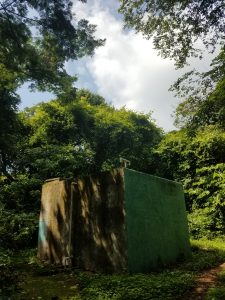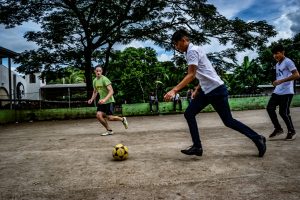 Companion Community Development Alternatives (CoCoDA) is a small organization with far reaching effects. CoCoDA partners with local organizations and communities in El Salvador and Nicaragua to accomplish community building projects. To do this, communities dictate which projects to work on and CoCoDA facilitates the project process and provides resources for the project’s completion. They occasionally plan trips with external organizations (many of these being universities) to help in the implementation.
Companion Community Development Alternatives (CoCoDA) is a small organization with far reaching effects. CoCoDA partners with local organizations and communities in El Salvador and Nicaragua to accomplish community building projects. To do this, communities dictate which projects to work on and CoCoDA facilitates the project process and provides resources for the project’s completion. They occasionally plan trips with external organizations (many of these being universities) to help in the implementation.
The organization originally peaked my interest because of it’s thoughtful approach to volunteering in a world where international volunteering has been somewhat sensationalized in the form of short term volunteer trips. I wanted to learn more about the effects of crossing cultural boundaries with good intentions, and how to minimize any possible negative effects. Spending two weeks in El Salvador with CoCoDA showed me that CoCoDA is among the unfortunately small ranks of organizations that realize that good intentions are not necessarily enough in international volunteer situations.
Judith Lasker, professor of sociology and anthropology at Lehigh University conducted a study researching short term medical volunteer trips (detailed in the book Hoping to Help). In doing so, she creates a list of nine separate criteria that, if met, will lead to the most positive experience for the host community. These nine, while derived specifically for medical trips can be generalized for broader short volunteer trips, like the ones that CoCoDA organizes. The nine criteria are:
· Foster mutuality between sponsor organizations and host-country partners at every stage
· Maintain continuity of programming
· Conduct substantive needs assessment, with host-community involvement
· Evaluate process and outcomes and incorporate the results into improvements
· Focus on prevention (medical trip specific)
· Integrate diverse types of health services (medical trip specific)
· Build local capacity
· Strengthen volunteer preparation
· Have volunteers stay longer
CoCoDA has taken these criteria and thought very carefully about the application of their delegations in host countries. In everything that they do, CoCoDA strives to remain culturally sensitive and provide long-term solutions rather short-term ones, solutions that build capacity and trust between peoples. During my trip I was able to visit projects sites that had been completed, project sites that are currently under construction, and meet to discuss potential new projects. The projects that CoCoDA assists in implementing range from schools to water systems. They have been involved in constructing roads as well as setting up scholarship programs, each of these are projects dictated by the communities that they are benefitting. By giving the communities the autonomy to decide the nature of support, it promotes mutuality, builds capacity, and is usually more sustainable in the long run.
The first week of the trip focused on learning the history of El Salvador and ensuring that the delegation was aware of our responsibilities visiting as USA citizens. This meant visiting sites of massacres, assassinations, listening to the stories of people, and visiting museums. Much of what we learned centered around the Salvadoran civil war in which the USA played an integral role. Throughout the civil war, the people faced brutal oppression from the government, and due to communist ideals promoted among the guerrilla troops, the USA financed the Salvadoran government. This support, however, allowed the country’s government to continue its ironfisted suppression of the peasant class giving way to massacres and assassinations to anyone who spoke out against the government. As a United States citizen, it was sobering to realize that our money supported the Salvadoran government before and throughout the civil war, supporting these heinous acts. This illumination of Salvadoran history as well as United States history played an integral part in our preparation, humbling us as US citizens while we interacted with the people of El Salvador.
CoCoDA’s goal with short-term volunteer trips is to facilitate experiences that could lead to support from visitors later on. Ideally, delegates would come back from trips and champion the image of a more just relationship between US citizens and Central Americans, being more likely to take it upon themselves to contribute meaningfully to the betterment of others.
During our stay in a hostel in Suchitoto (a city located north of San Salvador), I connected with three young men around my age. They were from Nicaragua and patiently helped me through the very rough Spanish that I had accumulated through Duolingo. Hanging out and hearing them speak so fondly about their country’s beauty and hearing the anguish in their voice as they told me how they worry for their family’s safety throughout the current conflict was a powerful experience. It was clear to me that these people loved their roots, that they were proud of who they were, hoping for the best in their countries. In the States, the common stereotype assumes that Central Americans do not like their own countries and want to immigrate to the US, but these three men as well as many others that I met in El Salvador made it clear that this is not a stereotype that holds. Most Central Americans love their country and would only emigrate if their lives were in danger.

The experience I had traveling in El Salvador was a wonderful and focusing experience. I do not know where I will end up in my professional life, but this trip has helped strengthen in me my desire to work for and with organizations like CoCoDA.